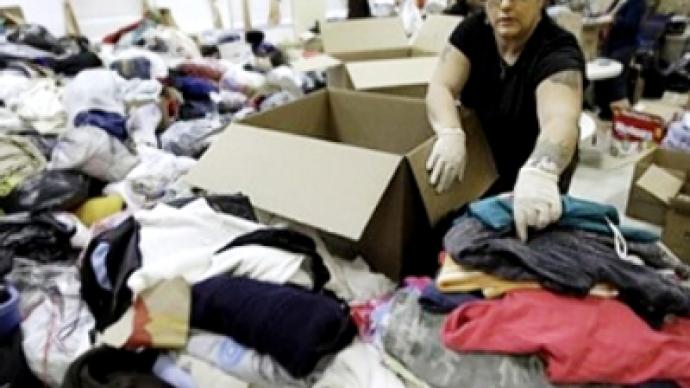Clothing: the unwanted necessity in earthquake ravaged Haiti

As the global call goes out for clothing to be immediately shipped to earthquake ravaged Haiti, some international relief agencies are asking people to hold onto their clothes and instead send badly needed cash.
While sending clothing is certainly considered an act of good will by organizations such as the Red Cross and Christian Reformed World Relief Committee, according to some relief agency experts, clothing drives can actually compound the natural disaster.
Says Richard Muffley, spokesperson for the Center for
International Disaster Information (CIDI), “We find that
shipping clothing is not nearly as efficient or even convenient
as making a cash donation because clothing is almost universally
available.”
Nonetheless, as word rapidly spreads via the world-wide web for
emergency food, medical and other supplies, retail chains from
around the world are organizing an effort to send clothing to the
near destroyed Haitian capital of Port-au-Prince.
According to Carla Fattal, the director for Fashion Delivers, a
charitable organization that organizes clothing relief efforts
from designers, retail outlets and others, not only for clothing
donations, but also bedding, “The need is so great that we
are appealing to the industry to step forward…We expect to send
several containers, and will continue sending until donations
reach their destinations.”
Some of the varieties of clothing being sent include sneakers,
sandals, and blue jeans that would normally be stored unused and
unsold in cardboard boxes as “extra inventory.”
For all its benign intent, Fattal’s more than $1 million strong
clothing efforts stand in the face of Tom Hazelwood’s
no-clothing-for-the-needy philosophy. So says the United
Methodist Committee on Relief (UMCOR) representative,
“Clothing is the worst gift that anybody could give…You get a
whole bunch of stuff and they (clothing) all end up in the
landfill somewhere because no one can sort them. Clothes are the
second disaster of every major disaster.”
Why would something so essential as clothing be considered so
disastrous?
Again, according to Hazelwood, clothing drives are labor
intensive and costly. This cost in labor is then transferred to
the already hurting disaster struck area. Adds Muffley, “We
find that typically in disaster locations, there are still people
who are marketing, who are selling, who have commodities and are
wishing to sell it into the disaster need.”
But why buy the clothes you need from local vendors when they are
being provided for free via charitable donations? Muffley
concludes, “We would rather see cash flow into the local
economy, flow through the clothing dealer, let him do his
purchases and make it an element of the rebuilding process.”
And in a country as poor as Haiti, pumping badly needed cash into
the local economy makes good financial sense. Pumping large
amounts of cash into the local economy can also happen a lot
quicker than shipping large, bulky, heavy containers of clothes.
A cash stimulus is also essential for the rebuilding of an urban
capital like Port-au-Prince. It would be a welcome windfall to
those already struggling, uninsured, local merchants who’ve lost
everything in the earthquake and who have no choice but to
rebuild or starve.
With no argument being waged over the need for essentials like
food, clean water, shelter and medical supplies for the survivors
of the Haiti earthquake disaster, the debate over whether or not
to send clothing will no doubt continue between those who would
rather see money injected into the country and those who would
rather find a good use for some unused fashions.
Vincent Zandri for RT













